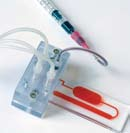CD4+ T lymphocytes, a type of white blood cell, function as the front guard of our body’s immune system in the defense against pathogens. The cells are the target for the HIV virus, and their absence is a key indicator of HIV infection.
Scientists recently developed an inexpensive device that allows people to test their CD4 cell levels and determine if they need antiviral medication. The small CD4-counter is being tested in Africa.
Xuanhong Cheng, an assistant professor of materials science and engineering, contributed to this research at Harvard Medical School, where she helped design, modify and test the microchip that functions as a cartridge for a handheld CD4 counter. She is continuing her work on the project at Lehigh.
“Now that the CD4 counting device is quite well developed, we’re moving to the next target, which is HIV viral counting,” says Cheng. “This is another important clinical indicator for HIV patients.”
At Lehigh, Cheng hopes to develop microdevices for environmental monitoring and for the detection of pathogens in air and water, an area whose applications include the prevention of bioterrorism.
She also hopes to develop tools for biological studies in well-controlled micro-environments.
“I’m interested in learning how cells respond to environmental stimulation. To do this, we keep cells in small microdevices where we can control the environmental conditions very precisely,” Cheng says. “We subject the cells to different stimuli and see how they respond in terms of secreting small molecules.
“When someone is vaccinated against a pathogen, T cells respond by expressing different surface markers on the cell membrane or by secreting different molecules. I’m hoping to develop a device that can be used for screening vaccine candidates."

